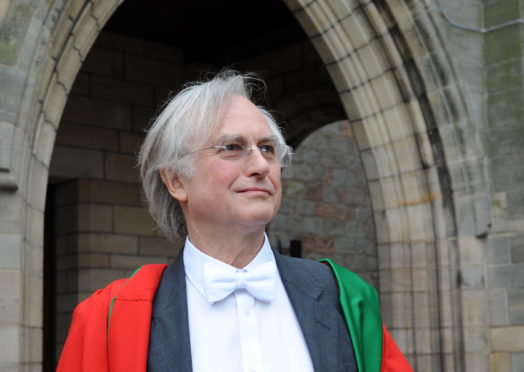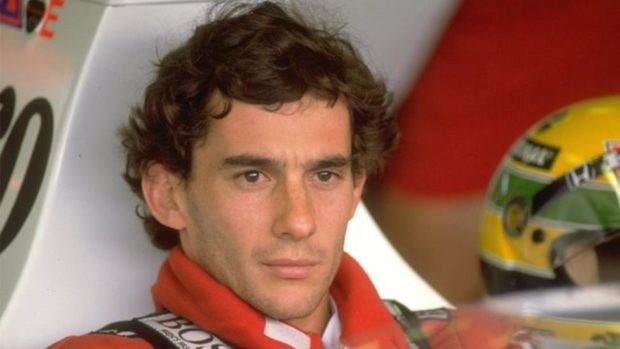Do you believe in Richard Dawkins?
Oh, I know he’s the high priest of British atheism with his own flock of slavishly devoted disciples, but I find myself rebelling a bit at his splenetic outbursts about God and the idiots who believe in Him.
In fact, he has much the same effect on me as those American evangelists who weep and wail about sin and repentance but become remarkably dry-eyed when they pass the collection plate around.
No matter the Church, the more someone tries to insist they are right and the opposition is sinful or thick, the more suspicious I get about their agenda.
I was reading about Dawkins and his new book just before the new year. It’s a strange time, that hiatus between Christmas and Hogmanay. The festive cork has popped, the straggling remnants of party popper streamers are lurking somewhere under the dining table, and the cheerfulness of a merry, merry Christmas has morphed into the seasonal depression that accompanies the approach of January.
I’m not alone on that one. In a survey a few years ago, almost 20% of British people considered New Year’s Eve the most depressing night of the year.
Anyway, at the end of last year, Dawkins produced a new book, Outgrowing God (another pithy little title, nicely in keeping with his usual intellectual snottiness) which I haven’t read but it is, apparently, largely based on The God Delusion, which I have.
I read it years ago in preparation for an interview with Dawkins and I was terrified. I had swallowed the intellectual titan mythology and assumed he would demolish me, along with the last vestiges of Christianity that I tentatively clung to. But I turned the pages with increasing incredulity and closed the book with an overwhelming question. Was that it?
Dawkins’ supposed demolition of God and faith seemed to me to fall into every trap that he claimed religion did – illogicality, sweeping generalisation, conjecture wrapped up as “fact”.
His stance centred entirely on evolution and he polarised science and religion, conveniently forgetting that it was a Catholic priest, Georges Lemaître, who first proposed the big bang theory and that the Church of England was among the first to embrace the theories of his beloved Charles Darwin.
Dawkins is said to be charming but impatient, and in person, I would say that his charm lasted for as long as you agreed with him – which in my case was about 2.5 seconds.
We talked different languages. You expect a scientist to be open-minded but I was astonished by his closed assumptions that challenging questions were hostile rather than enquiring, a sign of my stupidity rather than an opportunity for exploration.
Even his “investigation” of the miracle of Fatima culminated in dismissal because it defied the laws of physics. Isn’t the point of a miracle that it is inexplicable in rational terms?
As an interviewer, you explore the unknown. If I interview a bishop, I don’t want to hear a sermon about the strength of their faith, but a confession about the dark night of the soul when they almost lost it.
So, interviewing an atheist, I want to know if there have been moments when they desperately wanted to believe. Neither question indicates anything about my personal beliefs. Dawkins didn’t get that concept.
My favourite moment was when he magnanimously suggested there may be things I knew about that he didn’t (the nature of existence obviously not being one of them).
Football perhaps? As I said at the time, I laughed out loud, resisting the urge to wipe my nose on my sleeve and say no, but I was partial to a bit of dog baiting wiv my mates.
After publication, Dawkins was very cross indeed, sharing his diary entry for the day of the interview with outraged followers.
Apparently, I was rather stupid. I was, momentarily, a little bit humiliated but somebody offered me a wine gum or something which was sufficient diversion to get over it. Later, I won an award for the interview and found myself driving home afterwards, laughing at the delicious irony of it all.
One person’s stupidity is another’s insight. One person’s faith is another’s doubt. There is something about New Year – the cold reality, the taking stock, the failed resolutions and wilted ambitions.
That is what makes most of us focus just a little bit more on the meaning of our existence.
Everyone else seems to have more answers. What’s it all about, Alfie?
But we all struggle in our dark corners at times, asking questions and waiting for replies that never come.
We just choose to do different things with our uncertainties.
Some of us become atheists.
Some of us take the hopes and fears and doubts to church. January may exacerbate the existential blues.
But perhaps there is a strange comfort in the notion that as well as marking the final chapter of an old year, it heralds the opening chapter of a new story.
No one can tell you the meaning you impose on that story is wrong. Not even Professor Dawkins.











